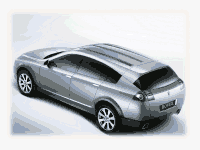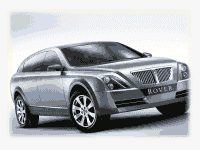|
|
ROVER 'TCV' STARS ON MG ROVER'S GENEVA STAND
Giving the first
public indication of Rover's future product design thinking, the Rover TCV (Tourer
Concept Vehicle) forms the centrepiece of the company's stand at the 2002 Geneva
Show.
TCV is shown as an external full size model, combined with
a dynamic virtual-reality demonstration of the ingenious interior package capabilities.
It has been created to show the company's styling and design vision for its new
vehicles. Although this concept is innovative and free-thinking, it has been designed
for genuine production feasibility.
 Recent
developments in world car markets reflect a growth in new categories of car, such
as MPVs, van-based estate cars and various 'cross-over' hybrid vehicles. Now,
the Rover TCV demonstrates a new way of combining luxury, style and driving enjoyment
with exceptional practicality and adaptability. Recent
developments in world car markets reflect a growth in new categories of car, such
as MPVs, van-based estate cars and various 'cross-over' hybrid vehicles. Now,
the Rover TCV demonstrates a new way of combining luxury, style and driving enjoyment
with exceptional practicality and adaptability.
As a starting point,
the TCV fulfils the normal Tourer role - a stylish modern 'lifestyle' estate car
with a roomy five-passenger cabin. Key features include:
-
A highly
adaptable seating plan. The rear three seat squabs all fold individually to lie
flush with the normal rear load floor, and the front passenger seat squab also
folds to this plane.
This allows several combinations of passengers and loads,
and any folded seats can also be used in 'table-top' mode for business or leisure
purposes. Very long items of up to 3.1 metres can be accommodated. The centre
rear seat squab can be replaced with various 'slot-in' modules, including a child
seat, an entertainment centre, a fridge/food warmer and a business desktop unit.
-
An
ingenious dual configuration for the rear loadspace area. In addition to a special
hatch door hinged well forward to give excellent access to the loadspace, the
lower bumper section also hinges open, revealing a large secure box-shaped underfloor
stowage compartment for a host of associated items. -
Current
and future developments in puncture management (Instant Mobility Systems and run-flat
tyres) will render spare wheels finally redundant.
-
 For
even greater versatility, the main load floor is designed so that it can be removed
from the normal position and stowed on the floor of the lower compartment, thus
creating an exceptionally deep cargo space with full-depth access from the rear.
One package objective was to be able to stow a normal front-loading washing machine
in the upright position. Rover's rationale for this was not to create a dedicated
washing machine 'delivery van', but to provide a universally recognisable demonstration
of the remarkable capability of the package. For
even greater versatility, the main load floor is designed so that it can be removed
from the normal position and stowed on the floor of the lower compartment, thus
creating an exceptionally deep cargo space with full-depth access from the rear.
One package objective was to be able to stow a normal front-loading washing machine
in the upright position. Rover's rationale for this was not to create a dedicated
washing machine 'delivery van', but to provide a universally recognisable demonstration
of the remarkable capability of the package.
To help with the insertion and
removal of such bulky and heavy loads the lower drop-down bumper has been engineered
to form a flush loading platform when open. Having such a 'basement-level' load
floor reduces loading effort and gives the lowest possible centre of gravity for
the installed load, to minimise its effect on vehicle handling.
-
TCV has
also been designed with extra ground clearance, appropriate wheels and tyres,
robust finishes for the lower body and wheel arches, and can accommodate advanced
traction control technology. -
Adding
further to the outdoor lifestyle benefits of TCV, are the special longitudinal
'Alpine Light' windows set into the roof panel.  Summing
up the TCV project, Rob Oldaker, MG Rover Product Development Director, said:
"This concept car gives a strong indication of the way that our Design team,
headed by Peter Stevens, is developing a bold new personality for Rover. The TCV
shows the kind of all-round versatility and luxury that we believe a Rover should
offer." Summing
up the TCV project, Rob Oldaker, MG Rover Product Development Director, said:
"This concept car gives a strong indication of the way that our Design team,
headed by Peter Stevens, is developing a bold new personality for Rover. The TCV
shows the kind of all-round versatility and luxury that we believe a Rover should
offer."
The TCV is an integral element of the programme, which will
spawn a new generation of MG and Rover products, the first of which will go on
sale in 2004. | |


Recent developments in world car markets reflect a growth in new categories of car, such as MPVs, van-based estate cars and various 'cross-over' hybrid vehicles. Now, the Rover TCV demonstrates a new way of combining luxury, style and driving enjoyment with exceptional practicality and adaptability.
For even greater versatility, the main load floor is designed so that it can be removed from the normal position and stowed on the floor of the lower compartment, thus creating an exceptionally deep cargo space with full-depth access from the rear. One package objective was to be able to stow a normal front-loading washing machine in the upright position. Rover's rationale for this was not to create a dedicated washing machine 'delivery van', but to provide a universally recognisable demonstration of the remarkable capability of the package.
Summing up the TCV project, Rob Oldaker, MG Rover Product Development Director, said: "This concept car gives a strong indication of the way that our Design team, headed by Peter Stevens, is developing a bold new personality for Rover. The TCV shows the kind of all-round versatility and luxury that we believe a Rover should offer."